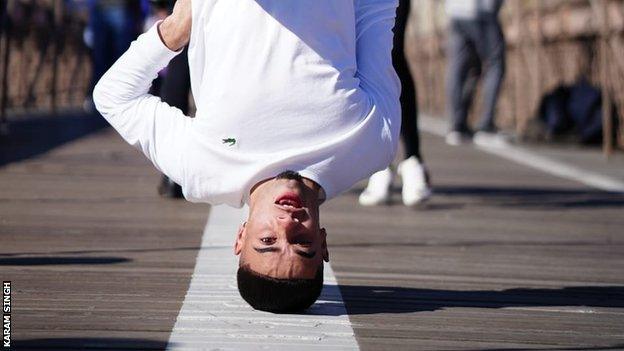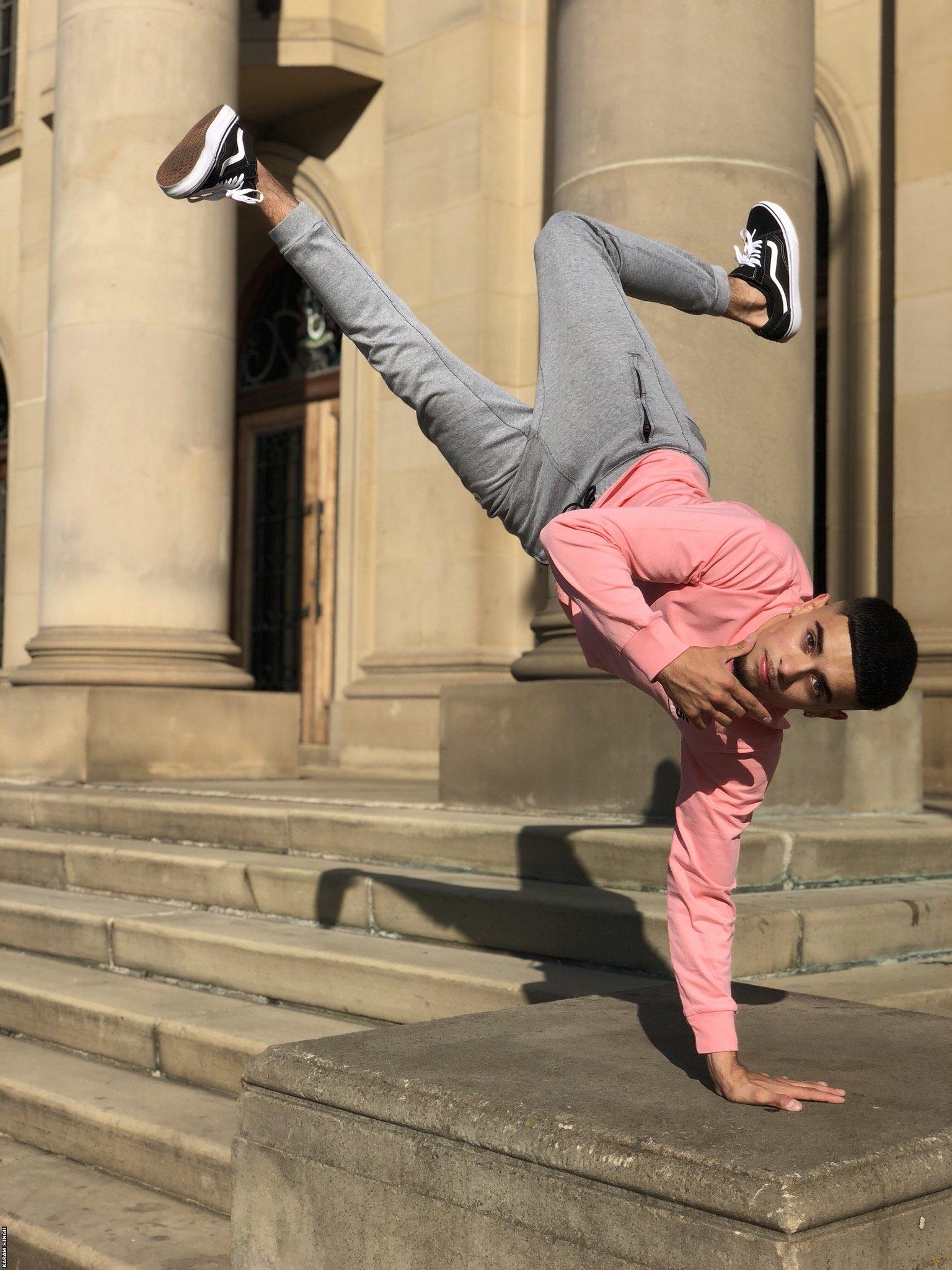Paris 2024: Karam Singh says breakdancing's inclusion would be 'incredible step forward'
- Published

Karam Singh made his World Championship debut aged just 10
"We're not taken that seriously because a lot of people don't understand what we do."
Britain's Karam Singh is breakdancing's world number 18. He's been dubbed "the Anthony Joshua" of the sport.
But unlike boxer Joshua, he doesn't have millions in his bank account. He self-funds his travel around the world, working part-time in a call centre while studying for a degree.
Yet with Thursday's news that 'breaking' is being proposed as a new sport for the Paris 2024 Olympic Games, the tides may be changing.
Perhaps now, breakdancing will be seen as more than just 'the worm' in a nightclub; more than someone spinning on their head on a dancefloor.
"I think it's an incredible step forward for the current generation and those to come in terms of the opportunities it is going to provide," Singh, 20, told BBC Sport.
"We sometimes get treated like we're kids, like we don't know what we're doing. The Olympics will open doors to us and allow us to actually be taken seriously."
Singh admitted he had not always considered breaking as a sport, but now, given the way he "trains, competes and performs", his mind has been changed.
Watch: 'I want to be like Usain Bolt... but in breaking'
'It's an addiction'
Aged just 10, Singh became the youngest breaker to step on the World Championship stage. Well, he actually appeared out of a bag, but that's another story.
Since then, he has travelled to all corners of the globe, winning time and time again, including last year's Street Dance World Cup in China.
He does it with no funding, no sponsorship, and while he has appeared in adverts for the likes of Apple, Nike and Adidas, fending for himself if something he has simply learned to live with.
"For the next two months, I'm out of the country every weekend and that requires a lot of energy so the lack of what we get back is frustrating," he said.
"Funding is all off my own back, I think for the majority of dancers that's the case unless they are lucky enough to be sponsored.
"But even when people do have cool brands sponsoring them, the majority are not paid, it's just free clothes or gifts.
"We've had to just get on with it just because we love what we do. It's an addiction."
The International Olympic Committee (IOC) will consider Paris 2024's proposal to include breaking - as well as climbing, surfing and skateboarding - and must reach a decision by December 2020.
Paco Boxy, the director of the British Breaking League, believes the Olympics would bring "credibility" to the sport.
"There is so much effort put into the sport and I am so happy it's getting the publicity it deserves to have," he told BBC Sport.

Karam Singh
'I train up to four times a day'
'Faster, higher, stronger' are the Olympic ideals. Some will say, and indeed already have, that breakdancing doesn't meet the cut. But Singh has a counter to that.
"As long as I'm in the country and not competing, I'm training every day, sometimes four times a day," Singh said. "As the elite, we take it a lot more seriously because we want to be the best.
"I take my diet seriously. I eat low calories, I hydrate and monitor my water intake, my sleep. I swim twice a week, and I run once a week in addition to working out and training.
"The way we battle in such a competitive way, as well as what our body demands of us to perform at a high level, highlights us as athletes.
"I create new movements in an artistic way but I practice and perform in an athletic way."
For the next generation of breakers, Singh says the Olympics would provide a "sense of direction" for an activity that has for so long been off the public's radar - or "underground", as Singh puts it.
"It will give them something to aim for, to be able to say they are training towards the Olympics would be an incredible motivation for them," he said.
'The Olympics would be a dream come true'
The proposal put forward to the IOC will see men's and women's events contested in Paris - involving 32 athletes in all - and comes just a year after the sport made its debut at the Youth Olympics Games in Buenos Aires.
It received a phenomenal response in Argentina, a sign perhaps the Olympics are changing to suit a new audience, and for Singh, it's an opportunity he won't take lightly.
"To represent my country at that level would be incredible, it would be a dream come true," he said.
"Breakdancing being an Olympic sport and allowing someone to say they are from Team GB gives them a name and a platform, allowing people to take them more seriously.
"From there, the opportunities and sponsorship would come naturally."
Boxy, who dubs Singh as the "AJ" of the sport due to his "humble and driven" nature, agrees, adding the Olympics would take the sport to "completely new levels" - though it appears not everyone agrees.
"There are two sides to the story," said Boxy. "There are people even in the breaking world who don't think it should be at the Olympics because they think it will damage the culture and history.
"But my response to that is that you can't erase history, anyone who has been involved in the sport since the mid-70s onwards, their job is to keep passing the culture on.
"Breakdancing in the UK right now is booming, but the whole world is too, especially for the young culture.
"People have seen snippets of what it's about at the Youth Olympics. It's something that needs to be seen. It's a beautiful thing."